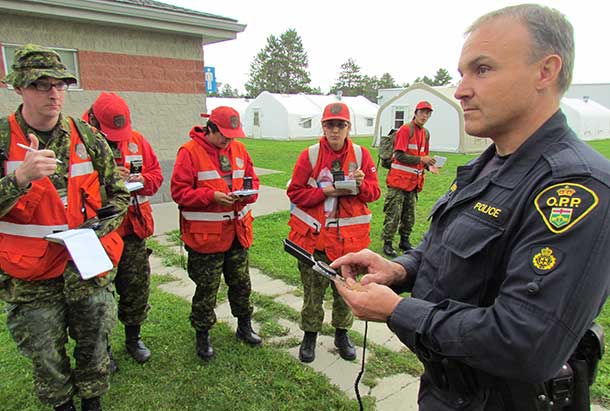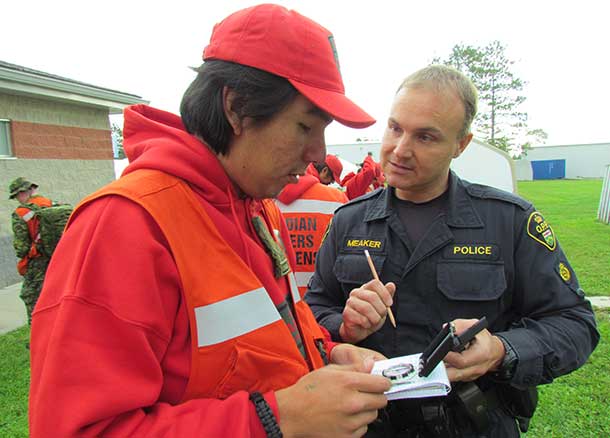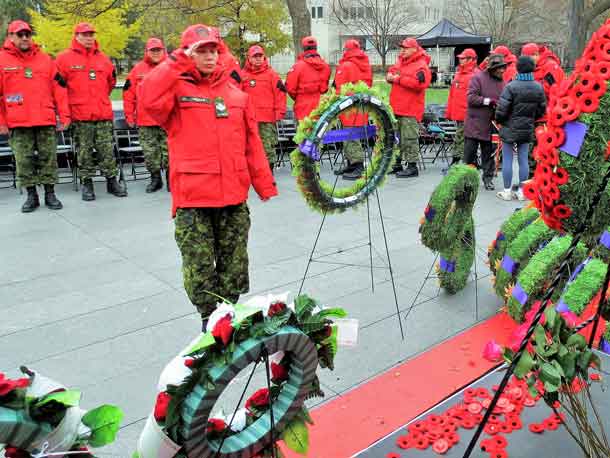

THUNDER BAY – A group of 14 Canadian Rangers from several remote First Nations from across the Far North of Ontario have completed a specially designed Ontario Provincial Police ground search and rescue operator’s course.
The course was conducted by the OPP at CFB Borden and in Mono Cliffs Provincial Park. It crammed what OPP members normally learn in 12 days into an intensive seven days. “It was an outstanding course,” said Warrant Officer Barry Borton, a Canadian Army instructor. “For us, working this way with the OPP was a partnership made in heaven.
“The Rangers were tired and worn out, but it was good because they got the impression of being in real searches. They learned how to talk to the OPP and they learned valuable search organizational skills.”
The course followed the signing of a memorandum of understanding by the OPP and the Canadian Armed Forces last year to have Canadian Rangers provide formal support in ground search and rescue (GSAR) operations in northern Ontario. Across Canada, provincial police services are the lead agency for GSAR. The OPP are the lead in Ontario, the Quebec provincial police in Quebec, and the RCMP in the rest of Canada.
The memorandum is the first of its kind in Canada and so was the week-long OPP course dedicated to training the Canadian Rangers.
“The value of the course to us is the ability to train an entire class of Canadian Rangers, instead of in ones or twos,” said Inspector Al Badour of the OPP’s emergency response team’s field support bureau. “It means a group of Rangers can learn basic search and rescue skills from us and then go back to their communities and be able to assist us and support us when we are running searches in their northern communities.”
Because they often occur near remote, fly-in communities, many of the searches in Ontario’s Far North are completed by Rangers before the OPP can assemble a specialized search team and fly it into the community.

“Most searches are over in the first 24 hours, before we can get a team in, especially if the search is weather related,” Inspector Badour said. “With the training the Rangers get on this course, if we arrive to take over a continuing search it’s a seamless transfer to us. We can walk into a Ranger command post and take over. The Rangers are using the same documents and procedures as us.”
The Rangers, he said, “have a lot of skill sets that people in the South just do not have, because of the harsh environment they live and work in. They are very good on the land. They know where members of their community are running trap lines or where they are likely to be if they are on a fishing trip or moose hunt or whatever.”
“The OPP instructors were great,” said Master Corporal Desiree Jacko of the Mishkeegogamang Ranger patrol. “They taught us a lot, especially how to search at night and overcome your fears in the dark. During a training exercise on the last day there was a time when my body felt as though I had to give up, but my mind wanted to keep going, because I thought of the exercise as a real search. And I did keep going.
“I loved the course. I loved the fact that we had to be determined. Learning the skills of search and rescue is a great tool to have, especially for our communities.”
(Sergeant Peter Moon is the public affairs ranger for 3rd Canadian Ranger Patrol Group at CFB Borden.)






